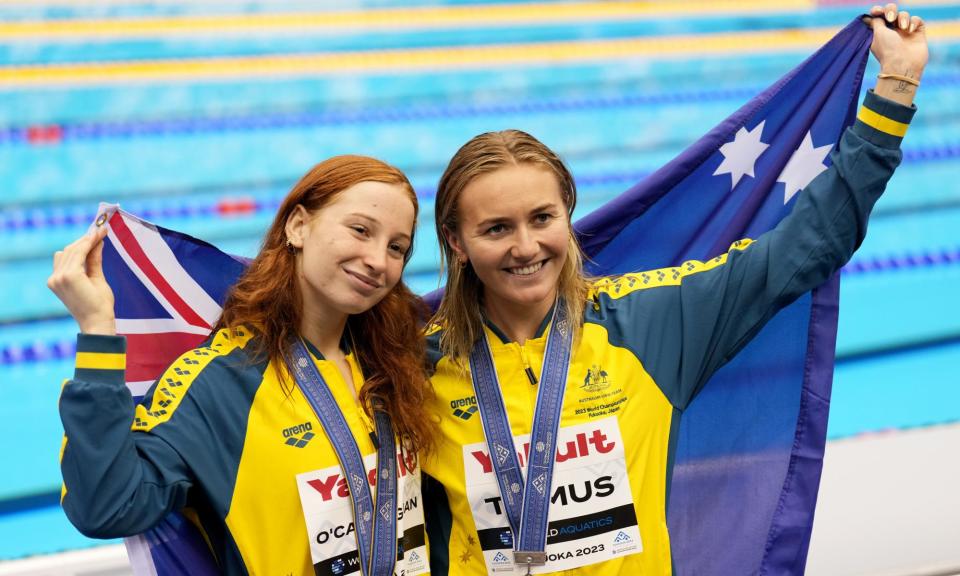Mollie O’Callaghan and Ariarne Titmus aim to get it just right in 200m freestyle showdown

The 200m freestyle discipline holds a distinct, curious place on the swimming roster. Swimmers with pure speed focus on the one-lap 50m dash, or the two-lap 100m race. Middle distance swimmers prefer the 400m, the 800m or even the endurance epic, the 1500m. The 200m is too long for unbridled sprinting, and too short for a more measured show of stamina.
In other words, it is the goldilocks event – swimmers must not go too fast so as to blow up, and not too slow so as to lose touch with the field. Finding that just-right middle ground is no easy task.
On Wednesday night, Australia’s female 200m freestyle swimmers will face off at the Olympic trials in Brisbane. It is one of the most hotly-anticipated races of the meet, as former world champion Mollie O’Callaghan faces off against friend, rival and Olympic champion Ariarne Titmus.
It is an intriguing match-up. Titmus is a middle-distance swimmer, famous for her 400m freestyle victory in Tokyo and a regular in the 800m freestyle. O’Callaghan has more pure speed, a two-lap specialist and world champion in the 100m freestyle in 2022 and 2023. They meet in the middle with the four lap 200m – O’Callaghan’s pace against Titmus’s endurance.
The 200m freestyle has wider significance, too. It doubles up with the 4x200m freestyle relay, meaning Australia’s depth takes them a long way towards gold (the Dolphins finished third in Tokyo, behind China and the United States, but won last year’s world title and set a new world record in the process). It is also an event with a distinct Australian pedigree. Susie O’Neill won gold at the 1996 Olympics, while swimming legend Shane Gould swum to victory at the Munich Games in 1972.
O’Callaghan, still only 20, is quiet and understated. Despite holding eight world titles to her name, she has not attracted quite the same public profile as her team-mates Titmus, Kaylee McKeown and Emma McKeon (something that will surely change in Paris). But the Queenslander, from Logan, carries with her an air of steely determination – a resolve that has quickly seen her become one of the best swimmers in the world.
She has been helped there by her coach, Dean Boxall, who famously also happens to coach Titmus. The pair train together under Boxall’s watchful eye – and when they compete together, he helps them plot race plans to beat each other.
Speaking on a podcast after the Tokyo Olympics, where Titmus had shone and a young O’Callaghan had shown her promise in the relays, Boxall described the unusual dynamic of coaching both. “You don’t get them to go against each other all the time,” he said. “You make sure you pick your fights and provide them with the opportunity to recover and be competitive. Mollie knows Arnie is the benchmark and Arnie knows Mollie is hunting.”
Following the Tokyo Olympics, Titmus was the benchmark – she followed up her statement 400m win over American star Katie Ledecky with gold in the 200m barely 48 hours later. But no longer. At the 2022 world championships, with Titmus missing, O’Callaghan finished second in the 200m – behind China’s Yang Junxuan. At the Commonwealth Games a month later, Titmus beat O’Callaghan to gold by a mere 12 one-hundredths of a second.
The stage was set for an almighty tussle at last year’s world championships in Fukuoka, Japan. Having qualified fastest, Titmus was in lane four – O’Callaghan was next to her in lane three. Titmus touched first on the first turn; she touched ahead again at the halfway mark, ahead of world record time. At the final turn, O’Callaghan was on Titmus’s hip – with half a body length to make up in just 50 metres.
But for those watching closely, O’Callaghan had deployed a slower stroke rate for the first three laps. She had also maximised her time underwater at each turn. And now, with a lap to go, the Queenslander turned for home and began to motor. With 25 metres to go, the pair were level. And by the end, it was all O’Callaghan – as she became just the second woman in history to go under 1 minute and 53 seconds, earning a new world record of 1.52.85 (Titmus finished on 1.53.01).
The victory means O’Callaghan enters Wednesday’s race as slight favourite. The pair are both in excellent form – on Monday Titmus nearly broke her own world record in the 400m, while on Tuesday O’Callaghan smashed a new personal best and qualified for Paris in the 100m backstroke, a discipline for which she barely trains.
But although she holds the world record, O’Callaghan freely admitted she enters the race with apprehension. “Obviously very, very nervous,” she said. “There’s a lot of pressure riding on this event – especially having the world record in it. And especially a lot of pressure from myself – I’m my biggest critic.”
On Wednesday, the race between O’Callaghan and Titmus will be exhilarating, but with limited ultimate meaning – they can both qualify for the Olympics. In seven weeks’ time, though, only one can stand atop the podium with a gold medal around their neck. Which swimmer will get it just right?

 Yahoo Sport
Yahoo Sport 



































































